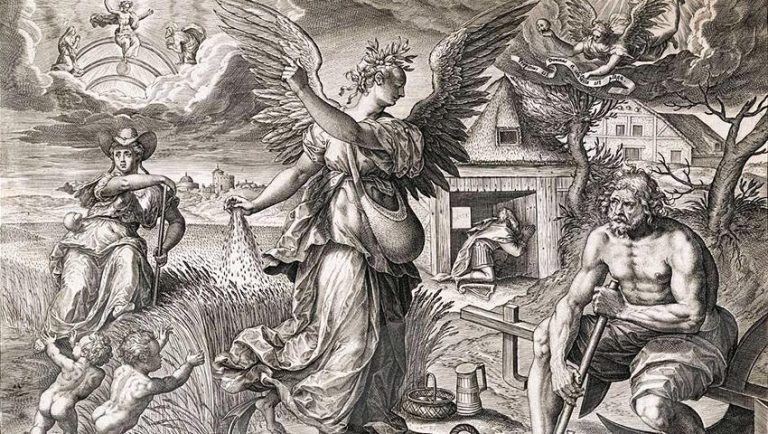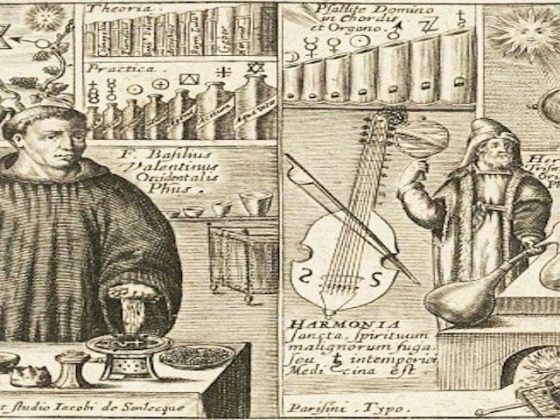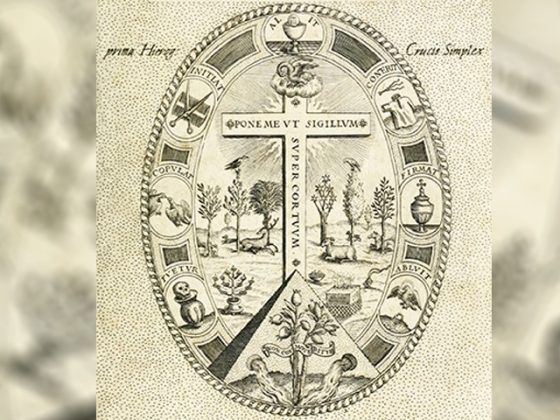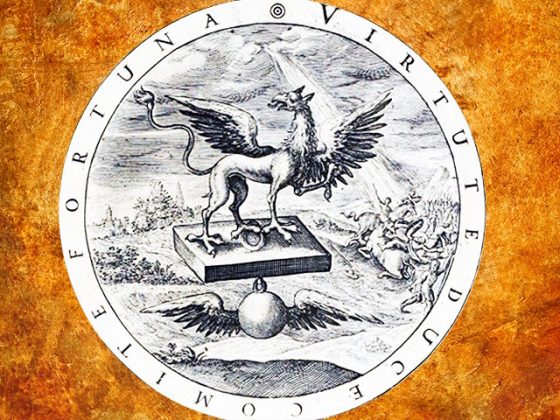Dearest readers:
I am sending you the third drawing in a series of engravings on the Christian virtues made by Hieronymus Wierix (1553-1619), according to the designs of Maerten de Vos (1532-1603).
The title of this print is…
…SPEIS FIDEI SEMEN PROMISSAE FIRMA SALVTIS ANCHORA, PER CHRISTVM GAVDIA RESTITVIT
─‘HOPE, SEED OF FAITH, FIRM ANCHOR OF PROMISED SALVATION, RESTORES HAPPINESS THROUGH CHRIST’─
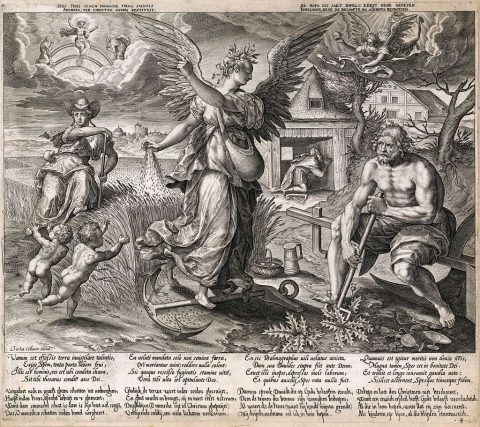
Entering into the subject of this engraving, we see in the center of it a winged female figure on an anchor, with a laurel wreath on her head, sowing wheat and pointing to the sky. Unquestionably, the woman in question is the VIRGIN MOTHER NATURE ─that is why she wears laurels on her head─ and at her feet the ANCHOR that, in addition to allegorizing the three primary forces, represents in Masonry the end of the hermetic work. It is obvious that it is STELLA MARIS –our blessed Mother Kundalini– who has the power to scatter the seed, the sacred seed, the Ens-Seminis that fecundates all of Nature, which includes human nature.
This woman points with the index finger of her left hand toward the clouds showing the figure of Christ, indicating with this gesture that the Lord of Perfections aspires to be incarnated in every man or woman who has deep spiritual longings. The Christ is being adored by Mary and John the Apostle, symbol of the incarnate Word.
Behind her appears another woman, wearing a hat and reaping the wheat. This is the WOMAN ADEPT, the one who loves alchemical transmutation.
In front of the central woman, a man digs a hole with his shovel among the thistles seeking to unearth his treasure ─crockery and coins─, and his action is accompanied by the following Latin sentence, namely:
Vanum est effossis terra inuigilare talentis. Erige Spem, tenta parta labore frui, Illic cor hominis, res est ubi condita chara. Sit Tibi thesarus conditus arce Dei.
Translation: ‘It is vain to watch over the coins unearthed from the Earth. Build hope, try to enjoy the things earned through work. The heart of man is where his precious patrimony is kept. May the treasure be guarded for you in the strength of God.'
On the other hand, the wheat seeds that remain in the air have also been indicated by another Latin phrase, let us see:
En ueluti mandata solo non semina farra. ─Ni moriantur enim─ reddere nulla solent: Sic quoque rescisso fugientis stamine uitae, Vera tibi uita opitulante Deo.
Translation: ‘Behold, as seeds not delivered to the ground —lest they die— do not usually return any farro, so also, once the thread of the fugitive life is severed, there is a true life for you if God gives help.'
Obviously, whoever transmutes his seed ─his sexual seed─ obtains eternal life.
In the background of our engraving we see King David repentant in a barn or cabin. He has a lyre at his feet. This lyre represents the incarnate Word and the finished Hermetic work. This scene is also accompanied by a Latin sentence, here it is:
En Sic Psalmographus uili uelatus amictu, Dum sua Davides stupra flet ante Deum. Eruet ille inopes, depressos mole laborum, Et quibus auxilij Spes rata nulla fuit.
Translation: ‘Behold, thus the psalmist veiled with a worthless garment, while David mourns his adulteries before God. He will find the needy, those oppressed by the burden of labor, and those for whom hope had been deemed null.'
The two naked children who appear near the Divine Mother symbolize the innocence that must be acquired in order to conquer the kingdom of the heavens.
Continuing our description, we find at the top right an angel with a skull in his hand showing the following text in Latin:
Propitius est Dominus et cohibita est plaga.
Translation: ‘The Lord is merciful and the plague has ceased.'
It is a reference to the second book of Samuel, chapter 24, verse 25, which sounds like this: “Propitiatus est Dominus Terrae et cohibita est plaga ab Israel,” which means “The God of the Earth was appeased and the plague ceased in Israel”.
To finish our description, let us observe the following Latin sentences:
Quamuis est igitur meritis non deuia nostris, Magna tamen Spes est in bonitate Dei. Et trahit et longo consumit gaudia uoto: Scilicet alternent Spesque timorque fidem.
Translation: ‘Therefore, as long as it is not turned away by our faults, hope in the goodness of God is great, and it brings with it and consumes joys with an enduring vow: it is evident that both hope and fear alternate in producing faith.'
Allow me, friends, to give you some propitious quotations with this engraving:
“Almost all devotees are curious. They indemnify themselves for the sins they do not commit with the pleasure of scrutinizing those of others.”
Mirabeau
“There is no doubt that true devotion is the source of tranquility.”
La Bruyère
“Heaven always favors the right request.”
Cervantes
“The greatest piety is the most secret.”
Sterne
FAVETE LINGUIS.
─‘Hold your tongues’─.
KWEN KHAN KHU


